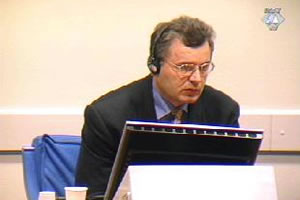Home
MILAN BABIC – A UNIQUE CASE
On the eve of the sentencing hearing, the prosecution points to a number of "firsts" in the case of Milan Babic, former president of the former Republic of Serbian Krajina, accused of participation in a joint criminal enterprise whose purpose it was to remove the non-Serb population from large areas of Croatia ( permanently and forcibly, and the credit due to the accused, proposing a prison sentence of eleven years.
 Milan Babic in the courtroom
Milan Babic in the courtroom Milan Babic is the first accused in the history of the Tribunal for whom it was not necessary to issue an arrest warrant. He voluntarily complied with the order summoning him to appear on 26 November 2003 before the Tribunal to answer the charges in the indictment issued just a week earlier.
This is just one of Babic's "firsts" listed in the brief in which the prosecution presents the factors which may be relevant for the actual sentencing. In the view of the prosecution, his case is in many ways unique, and has been unique right from the start.
For Babic, the case began in September 2001 when the "Croatia indictment" against Slobodan Milosevic was issued. When he learned from the press that his name was on the list of the 15 participants in the joint criminal enterprise, Babic immediately contacted the Office of the Prosecutor and agreed to be interviewed as a suspect. For security reasons, Babic the suspect gave a series of interviews to the investigators at a secret location in Serbia, stretching over a number of days. Babic was accompanied by a lawyer assigned to him by the Registry of the Tribunal.
At the beginning, as the prosecution brief states, Babic claimed to be "shocked by the allegations", but gradually he began to "speak more openly about the events in Croatia and his role in them". As the third round of interviews drew to a close, in late February 2002, he started to accept his responsibility for the things he had done led by his own "vanity" and "ethnic egoism", as he described it.
In the course of the interviews, Babic handed over to the investigators many "important documents" and confirmed the authenticity of the documents already in the possession of the Office of the Prosecutor. Thus, the brief states, Babic "saved enormous resources and effort" that the prosecution would otherwise have had to devote to gain possession of the documents or to confirm their authenticity in order to be able to incorporate them into the evidence for future indictments and trials of other participants in the joint criminal enterprise.
As he testified for 12 full days at the trial of Slobodan Milosevic, Milan Babic, in the view of the prosecution, presented to the Trial Chamber an "unprecedented" amount of direct evidence of the role of the former Serbian president in the war in Croatia. The quantity and quality of the evidence were "of the greatest possible importance for the prosecution case" and considerably reduced the need to conduct further investigations and adduce additional evidence. The prosecution believes that future Babic's testimony at the trials of Momcilo Krajisnik and Milan Martic will be of the same order of importance.
The uniqueness of Milan Babic's case is reflected in his guilty plea, which, the prosecution believes, is substantially different from the guilty pleas of other accused. With the exception of Drazen Erdemovic, all the others pleaded guilty after a lengthy period in detention, on the eve of the trial or once the trial had actually started, when it became clear that the prosecution has incontrovertible evidence of their guilt. Babic, however, pleaded guilty soon after the indictment was made public and the only reason why he sought the 30-day delay, at the advice of his lawyer, was to allow the sides some time to conclude the plea agreement.
According to the plea agreement, the prosecution and the defense will jointly seek a sentence of 11 years in prison for Babic. The hearing at which all the circumstances relevant for the sentence will be considered has been scheduled for the coming Thursday and Friday.
